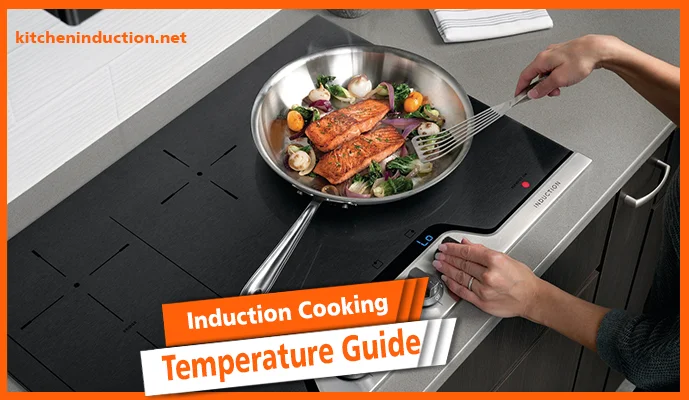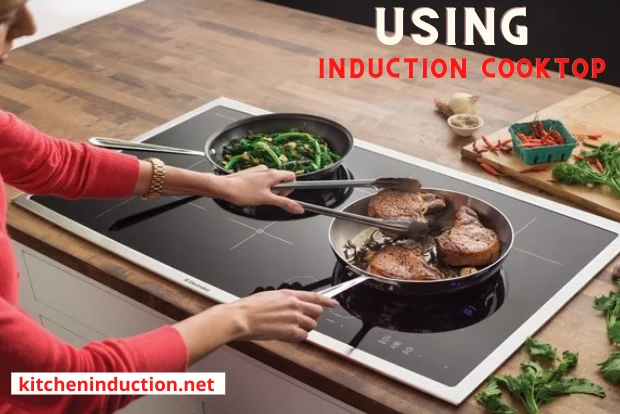Reasons of Induction Cooktop Noise (High Pitched Humming Sound)
Many electrical/electronic devices make noise because it’s their nature. The induction cooktop is also an electrical device that may cause sound. If we go back to the machinery era, the noises were much louder than nowadays. In contrast, as the modern world is progressing, human comfort is on top priority due to high competition. If you are rice lover and cook rice on induction hob, you need to get the best rice cooker with induction heating for the best results and reduced noise.

Since induction cooktops are a modern invention in the cooking industry, their sound is far less than other cooking devices. The induction cooktop works on the principle of electromagnetism. Although the induction stoves do the cooking process without any sound, they generate the heat silently to cook the food.
However, many people say that they hear some sounds like buzzing, humming, or even rattling of cookware while cooking on induction. Simply you can say the stove is making noise which disturbs the whole routine.
These sounds are completely harmless, but they could be shrill or unpleasant sometimes. You don’t need to worry about your induction cookware due to these sounds because these are normal. These sounds don’t cause any harm, and secondly, there is no cookware or material defect due to which sound is developing.
There are different reasons for developing the induction cooktop noise. It is either due to the humming noise that the cooktop is creating or the buzzes. In addition, it could be the cookware or the fan that is built in the cooktop. Sometimes, there is noise due to small impurities on the glass surface if the cleaning of induction cooktop is not done. Now, we will describe different types of sounds in induction cooktop and their reasons.
Different Induction Cooktop Noises:
Let’s have a look at the different types of noises that you hear in the induction cooktop:
There are a lot of reasons due to humming sound is emitted from induction stoves. The one and the main reason is the embedded fan in the stove. Generally, that fan is quieter than the exhaust hood. The main purpose of embedding that fan is to dissipate the heat generated while cooking the food.
Since the induction cooktop is an electronic device, it has a controlled temperature feature to function accurately. The fan runs at various speeds according to what temperature it detects. However, the fan still operates even if the cooktop is switched off in order to control the high temperature.
Another humming sound is caused by the energy transmitted from the appliance to the cookware. The sound will be quiet and may disappear when the cooktop will heat up properly or when the power is shut down.
Like humming sound, there could be different reasons for ticking or clicking sound. The first reason is the sound is created when the control cycle switches the power on and off. Usually, this sound doesn’t last long.
The other reason for this sound is using the low power setting of the induction cooktop. The third reason for this sound is the type of cookware. For example, if you use a cast iron pan, it will create a ticking or clicking sound that will be clearly audible.
This type of sound generally occurs when the cookware is made of more than one material. The reason for the sound is the vibrations in the joint faces between two different types of material layers. The sound may vary depending on the size of cookware and the amount of food being cooked inside it.
There will be more noise if the cookware is made of lightweight stainless steel or multi-ply stainless steel. Such cookware is something less than ideal. You can say they are not defective but good for induction cooking. There is a sandwich of different metals in lower-quality clad cookware, like steel inside and steel outside with aluminum in the middle.
Now, here one thing is to clear that if the middle layer is not welded, it will move inside and create a buzzing sound. If we talk about high-quality cookware, there will be no buzzing sound. However, in low-quality clad cookware, it is caused by high-frequency oscillations of the magnetic field. Generally, it happens when high power is supplied. The noise is not too louder, but it could be annoying.
Another reason for such sound is the loose-fitting handles of cookware. When focusing on them, they seem to vibrate, especially in high-power settings. Furthermore, if the pans have irregular bottoms, they can vibrate audibly on the glass surface. The noise will be like a buzzing bee.
In addition, the pans can make different sounds when the moisture gets trapped within the pan while boiling in the pan and the bottom in contact with the flat cooktop. High pressure could create a different kind of sounds.
How to Reduce Induction Cooktop Noise
A higher temperature while cooking on an induction cooktop means the stove will make a noise. Try to low down the temperature if it’s possible. The lower temperature will supply not only more steady heat but also reduce the noise.
The heavy pots work better and reduce excessive noise. The cast iron material is perfect in this sense. The heavier cookware produces very little noise as compared to lighter cookware. It will not move or wobble while cooking the food.
The second reason for choosing heavy cookware is that they fit well on the glass surface and completely covers the heating element. Covering the whole heating element means the vibrations are lessened or eliminated. You will rarely hear any whistling sound.
Using one-piece cookware can reduce noise emissions amazingly. Examples of one-piece cookware are carbon steel pans, cast iron skillets, or enameled steel pans
When you cook on the induction cooktop, try to get such cookware that will cover the whole element. There is a copper coil under the surface which distributes the electromagnetic current to the cookware.
On the other hand, if the cookware is small to cover the entire element, it will cause vibration and result in a whistling sound.
Using the loose-fitting handles over the induction cooktop will cause vibrations while cooking—the same thing for lids that don’t fit tightly on the pot.
Using the high temperatures on the induction cooktop while using the lightweight cookware means a buzzing sound. The highly energetic flow caused by higher energy settings will create vibrations in the system and create sounds.
So always use intermediate power settings that are good for cooking and will not create any unwanted sound.
Conclusion
Most people don’t like the noisy kitchen. Everyone wants to have a quiet induction cooktop in their kitchen. We hope you have a better idea of why an induction cooktop makes noise and how you can rescue it. We have explained all types of noises in induction cooking, and following the above tips, you can have control over noise on induction or ultimately make it noiseless. If there is still some noise, it’s just a part of induction cooking which is entirely harmless.



